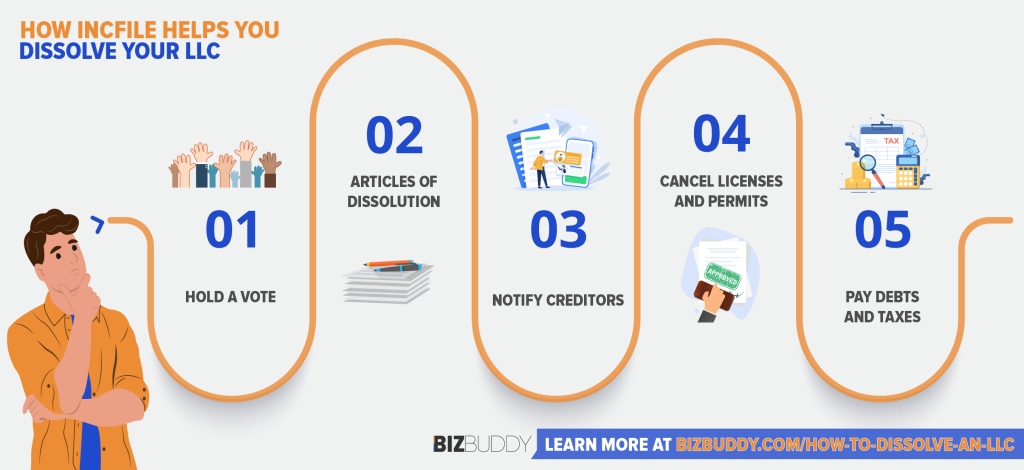How to Dissolve an LLC in California
Contents
- How to Dissolve an LLC in California
- Assessing the Need to Dissolve Your LLC
- Review the LLC Operating Agreement
- Obtaining Approvals from Members and Managers
- Settling any outstanding debts and obligations
- Completing the required tax filings
- Preparing the Certificate of Dissolution
- Notifying relevant parties about the dissolution
- Maintaining Records and Documents
- FAQs on Closing an LLC
- How much does it cost to close an LLC in California?
- Can you dissolve California LLC online?
- How long does it take to dissolve an LLC in California?
- Do you have to pay the $800 California LLC fee the final year?
- How do I let the IRS know I closed my business?
- What is the difference between dissolution and termination of LLC in California?
- How do I close a single-member LLC in California?
- Can I abandon an LLC in California?
- Can I use a bank account after dissolving an S corporation?
- Where can I close my LLC?
- Is the $900 LLC fee deductible for California?
- What is the difference between dissolution and cancellation?
- Conclusion
The life cycle of a business is not always a smooth ride. Sometimes, business owners may need to dissolve their LLCs for various reasons. Dissolving an LLC in California can be a complex and confusing process, but it doesn’t have to be. In this step-by-step guide, we’ll walk you through the process of dissolving your LLC in California. From filing the necessary paperwork to notifying creditors and distributing assets, we’ll cover everything you need to know to dissolve your LLC quickly and efficiently, without any legal complications. So, if you’re ready to move on from your LLC, let’s get started.

It’s worth noting that the specific requirements and procedures for dissolving an LLC may vary depending on factors such as the nature of your business, the number of members, and any existing operating agreements. We always recommended consulting with a qualified attorney or tax professional who specializes in business law to ensure compliance with all legal and financial obligations.
Now, let’s dive into the process of dissolving an LLC in California, step by step, to help you make informed decisions and successfully bring closure to your business entity.
Assessing the Need to Dissolve Your LLC
Dissolving an LLC should not be taken lightly, as it involves legal and financial implications. Therefore, it is essential to thoroughly evaluate your situation and the reasons behind considering dissolution.
- Evaluating the current state of your LLC. Ask yourself whether the business is still viable or if it has become unprofitable or irrelevant. Consider factors such as financial stability, market conditions, and the overall success of your business. If you find that your LLC is no longer fulfilling its purpose or generating the desired results, it may be a sign that dissolution is necessary.
- Consider the goals and objectives of the LLC’s members. Are they aligned with the current direction of the business? If there is a lack of consensus among members or a significant change in the original vision, it might be an indication that dissolving the LLC is the best course of action.
- Consider the legal obligations and compliance requirements. Assess whether your LLC is meeting all necessary legal obligations, such as filing annual reports, paying taxes, and maintaining proper documentation. Failure to comply with these obligations can result in penalties and legal consequences, further complicating the dissolution process.
- Evaluate the financial implications of dissolving your LLC. Consider any outstanding debts, loans, or contractual agreements. Will the LLC be able to fulfill these obligations upon dissolution? It is crucial to have a clear understanding of your financial situation to ensure a smooth and orderly dissolution process.
Review the LLC Operating Agreement
This legal document outlines the rights and responsibilities of the members, as well as the procedures for the operation and dissolution of the company. It is essential to carefully examine the agreement to understand the provisions related to dissolution, as they may vary depending on the specific terms agreed upon by the members.
An LLC operating agreement should have been created when the LLC was first formed and should be readily accessible to all members. Take the time to thoroughly read and comprehend its contents. Pay close attention to any sections or clauses that pertain to the dissolution, winding up, or termination of the LLC.
These sections may include information on the required voting thresholds, procedures for notifying members and creditors, and the distribution of assets and liabilities. It is important to understand the steps and obligations outlined in the operating agreement, as failure to comply with these provisions may result in legal complications or disputes among the members.
If you find any ambiguities or uncertainties in the operating agreement, it is advisable to seek legal counsel. An attorney experienced in business law can provide guidance and clarification to ensure that the dissolution process is conducted properly and in accordance with the agreement and California state laws. Their expertise can help you navigate through any complex legal language or intricacies that may arise during the review of the operating agreement.
Obtaining Approvals from Members and Managers
Your LLC’s operating agreement will typically outline the process for obtaining approvals. This agreement serves as a legal document that governs the internal affairs of the LLC, including dissolution procedures. It may require a certain percentage of member or manager approval, or it may have specific guidelines for voting and decision-making.
Hold a meeting with all members and managers to discuss the dissolution and obtain their consent. Ensure that everyone is aware of the implications and consequences of dissolving the LLC. This is also an opportunity to address any concerns or questions that may arise during the process.
During the meeting, document the approvals obtained. Take detailed minutes of the meeting, including the names of attendees, the date and time of the meeting, and the decisions made. These minutes will serve as evidence that the necessary approvals were obtained in accordance with the LLC’s operating agreement.
In some cases, unanimous consent may be required to dissolve the LLC. This means that every member and manager must agree to the dissolution. If this is the case, it is crucial to ensure that everyone is actively involved in the decision-making process and that their consent is properly documented.
Keep in mind that obtaining the necessary approvals may take time, especially if there are multiple members or managers involved. It is important to be patient and allow for open and honest communication among all parties. Dissolving an LLC is a significant decision, and ensuring that everyone is in the agreement will help streamline the process and avoid any potential conflicts or legal issues down the line.
Settling any outstanding debts and obligations
Before officially dissolving your LLC in California, it is crucial to settle any outstanding debts and obligations. This step is vital to ensure a smooth and legally compliant dissolution process. Failing to address these financial matters can lead to potential legal issues and damage to your personal and business reputation.
Thoroughly review your company’s financial records, including:
- outstanding invoices
- loans
- other financial obligations
Take the time to contact all creditors and notify them of your intent to dissolve the LLC. It is essential to communicate openly and transparently, providing them with accurate information about the dissolution process.
Settle Debts
Work with your creditors to develop a repayment plan or negotiate settlements if necessary. This may involve making partial payments, setting up a payment schedule, or reaching a mutually agreeable resolution. Keep detailed records of all communication and agreements, as these will be important for future reference.
Settle Tax Obligations
Ensure that all tax obligations are fulfilled before dissolving your LLC. This includes paying any outstanding state and federal taxes, filing the final tax return for your LLC, and obtaining a tax clearance certificate from the California Franchise Tax Board.
Settle Legal Matters
Address any pending legal matters or lawsuits involving your LLC. Consult with an attorney to guide you through the process and ensure that all legal proceedings are properly resolved or transferred to the appropriate parties.
Completing the required tax filings
Completing the required tax filings is a crucial step in the process of dissolving an LLC in California. Failing to properly handle your tax obligations can lead to penalties and complications down the line. Here’s a step-by-step guide to help you navigate this aspect of the dissolution process.
- Consult with a tax professional: Before you proceed with any tax filings, it’s advisable to seek guidance from a qualified tax professional who is well-versed in California tax laws. They can provide you with personalized advice based on your specific situation and help ensure that you meet all the necessary requirements.
- File your final tax return: As an LLC, you are required to file a final tax return with the California Franchise Tax Board (FTB). This return will cover the period from the beginning of the tax year up until the date of dissolution. Make sure to accurately report all income, deductions, and credits applicable to your LLC.
- Pay any outstanding taxes: If your LLC owes any outstanding taxes, it’s important to settle these before proceeding with the dissolution. The FTB will expect full payment of any tax liabilities, including any penalties or interest that may have accrued.
- Submit the Final Return or Certificate of Cancellation: Along with your final tax return, you will need to submit either the Final Return or Certificate of Cancellation, depending on the circumstances surrounding the dissolution of your LLC. The Final Return is filed if you have completed the winding-up process and distributed the remaining assets among the members. The Certificate of Cancellation is filed if you have not yet completed the winding-up process.
- Obtain tax clearance: To ensure that all tax obligations have been met, you may need to request a tax clearance certificate from the FTB. This certificate provides proof that your LLC has satisfied all its tax responsibilities. While obtaining a tax clearance is not mandatory for all LLCs, it can be beneficial to have one, especially if you plan to engage in future business activities.
Throughout the dissolution process, it is essential to maintain thorough records and documentation of all your tax filings and related correspondence. This will help you demonstrate compliance with the necessary requirements and provide evidence if any issues arise in the future.
Preparing the Certificate of Dissolution
Preparing the Certificate of Dissolution is the next step in the process of dissolving an LLC in California. This document officially notifies the state authorities that your LLC will no longer be operating and should be filed with the California Secretary of State.
To begin, gather all the necessary information and documents required for the Certificate of Dissolution. This typically includes the following:
- LLC Information: Provide the legal name of the LLC, as well as the date of formation and the LLC number assigned by the California Secretary of State.
- Statement of Dissolution: Clearly state the reason for the dissolution of the LLC, whether it is due to the expiration of a specific term, a unanimous vote by the LLC members, or any other valid reason.
- LLC Members’ Consent: Obtain written consent from all LLC members, signifying their agreement to dissolve the LLC. This consent should be included as an attachment to the Certificate of Dissolution.
- Tax Clearance: If applicable, ensure that all necessary tax returns have been filed and any outstanding taxes have been paid before proceeding with the dissolution. It is recommended to consult with a tax professional to ensure compliance with state tax requirements.
- Filing Fee: Prepare the required filing fee for the Certificate of Dissolution. The fee may vary, so it is advisable to check the current fee schedule provided by the California Secretary of State’s website.
Once you have gathered all the necessary information and documents, you can proceed with preparing the Certificate of Dissolution. You can either download the official form from the California Secretary of State’s website or use the online filing service that provides templates for dissolution documents.
Carefully complete all the required fields and ensure that the information provided is accurate and up-to-date. Any mistakes or omissions could result in delays or complications in the dissolution process.
After completing the Certificate of Dissolution, review it thoroughly to ensure its accuracy. Make copies of all the documents for your records before submitting the original to the California Secretary of State’s office.
Once the Certificate of Dissolution is filed and accepted by the California Secretary of State, the LLC will no longer be considered an active entity. Therefore, it is essential to fulfill all obligations, such as notifying creditors and settling any outstanding debts, before proceeding with the dissolution.
Notifying relevant parties about the dissolution
When dissolving an LLC in California, be sure to notify all relevant parties about the dissolution. This step is essential to ensure a smooth and legally compliant process.
First, you need to inform the California Secretary of State’s office about the dissolution as outlined above. This can be done by filing the appropriate paperwork, such as the Certificate of Dissolution or Certificate of Cancellation, depending on the type of LLC you have. Make sure to follow the specific instructions provided by the Secretary of State’s office to avoid any delays or complications.
Franchise Tax Board (FTB)
Notify the Franchise Tax Board (FTB) about the dissolution. The FTB is responsible for overseeing the tax-related matters of businesses in California. By informing them about the dissolution, you can avoid any further tax obligations or penalties associated with your LLC.
Licensing and Regulatory Agencies
Notify any relevant licensing or regulatory agencies that your LLC is no longer operating. This may include industry-specific boards, professional associations, or local government agencies that have granted you permits or licenses to conduct business.
Other Interested Parties
Inform your business partners, suppliers, creditors, and clients about the LLC’s dissolution. This can be done through written notifications or by publishing a formal announcement in a local newspaper. Notifying these parties ensures that they are aware of the LLC’s status and can take appropriate actions, such as terminating contracts or settling outstanding debts.
Close All Company Accounts
Don’t forget to close any bank accounts, cancel business insurance policies, and dispose of any remaining assets or property owned by the LLC. Taking care of these administrative tasks will help finalize the dissolution process and prevent any unnecessary liabilities or complications in the future.
Maintaining Records and Documents
Keep copies of all your official LLC documents, including the Articles of Organization, Operating Agreement, and any amendments made throughout the life of the business. These documents provide a comprehensive history of your LLC and are essential for any legal or financial matters that may arise down the line.
Maintain records of all financial transactions, such as bank statements, invoices, receipts, and tax returns. This documentation will help you keep track of your financial obligations and ensure compliance with tax laws. It also provides a clear financial trail of your LLC’s activities, which may be required in case of any future audits or disputes.
Retain any contracts, agreements, or licenses that your LLC obtained during its operation. These documents can be valuable references if you ever need to revisit past agreements or if there are any outstanding obligations that need to be resolved during the dissolution process.
Consider creating a well-organized and easily accessible electronic or physical filing system to store all these records. Categorize them appropriately, such as by year or type, to make retrieval and reference more efficient when needed. It’s also a good practice to keep backups of your electronic records in a secure location, such as cloud storage or external hard drives, to protect against data loss.
FAQs on Closing an LLC
How much does it cost to close an LLC in California?
It typically costs $20 to dissolve an LLC in California. In addition to this filing fee, you must also pay any taxes owed and submit a Statement of Dissolution to the Secretary of State.
Can you dissolve California LLC online?
Yes, you can dissolve your California LLC online through the state’s e-filing system. The process is fast and secure.
How long does it take to dissolve an LLC in California?
It typically takes two to four weeks for the dissolution process to be complete. However, this timeframe may vary depending on the amount of paperwork involved, as well as other factors.
Do you have to pay the $800 California LLC fee the final year?
No, you do not need to pay the $800 California LLC fee upon dissolution. However, you may owe taxes depending on the amount of profits earned during the year.
How do I let the IRS know I closed my business?
You can let the IRS know that you closed your business by filing Form 966 (Corporate Dissolution or Liquidation) with the IRS. This form will inform them that you are closing your LLC and provide details about its closure.
What is the difference between dissolution and termination of LLC in California?
Dissolution is the legal process of terminating an LLC, while termination occurs when all liabilities are settled and all assets have been distributed among members according to their membership interests.
How do I close a single-member LLC in California?
If you are the sole member of an LLC in California, you can dissolve it either through the online filing system or by submitting Form LLC-3 (Articles of Dissolution) directly to the Secretary of State.
Can I abandon an LLC in California?
No, abandonment of an LLC is not allowed in California. Dissolution must be completed properly through the online filing system or by submitting Form LLC-3 (Articles of Dissolution).
Can I use a bank account after dissolving an S corporation?
Yes, you can continue to use a bank account after an S corporation has been dissolved, provided that you notify the bank in writing of the dissolution.
Where can I close my LLC?
You can close your LLC either through the online filing system or by submitting Form LLC-3 (Articles of Dissolution) directly to the Secretary of State.
Is the $900 LLC fee deductible for California?
No, the $900 annual tax imposed on LLCs registered in California is not a deductible expense for income tax purposes.
What is the difference between dissolution and cancellation?
Dissolution is the legal process of terminating an LLC, while cancellation occurs when a business license or permit issued by the state is revoked because of noncompliance with regulations or statutes.
Conclusion
We hope you found our step-by-step guide on how to dissolve an LLC in California to be helpful and informative. Dissolving an LLC can be a complex process, but by following the steps outlined in our blog post, you can ensure that you navigate the process smoothly and efficiently. Remember to consult with a legal professional for specific advice related to your situation. By properly dissolving your LLC, you can tie up any loose ends, protect yourself from future liabilities, and move forward with confidence. Good luck with your LLC dissolution journey!




